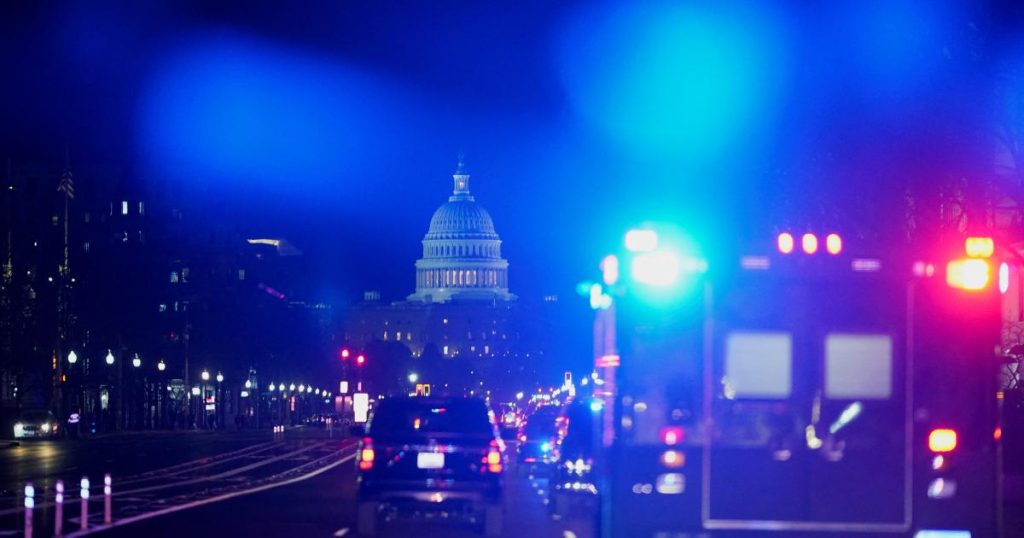The first few weeks of Donald Trump’s second presidency have accelerated a process of democratic erosion in the United States. In just two months, the president and his allies have issued executive orders of dubious constitutionality, violated the civil protections of federal workers, impinged on Congress’s powers over the budget, sidestepped and defied court rulings, used the Justice Department to punish opponents and protect loyalists, threatened to impeach judges who rule against the administration, weaponized U.S. Immigration and Customs Enforcement and immigration law to imprison and deport documented immigrants without due process, and allowed unappointed individuals an unprecedented (and potentially illegal) level of access and power over key agencies such as the U.S. Agency for International Development, the Treasury Department, and the Education Department.
Democratic erosion has not progressed as far in the United States as it has in many other countries, but that does not make the steps the Trump administration has taken any less concerning. At a minimum, democracies should afford citizens the opportunity to form and express their preferences and have them weighted equally in government. To do so, citizens must enjoy individual rights such as freedom of association, freedom of expression, and freedom of movement. Checks and balances exist to guarantee those rights. They are meant to prevent abuses that—under the guise of majoritarian support—could limit citizens’ ability to participate in government on an equal footing. The Trump administration’s willingness to bypass the law, defy courts, and weaponize state institutions to punish opponents threatens that political participation and, in doing so, threatens democracy.
For democracy to survive, it must be protected. In the past few decades, in countries such as Argentina, Brazil, Colombia, and Poland, opposition groups pushed back successfully against leaders with authoritarian tendencies early in the process of democratic backsliding, when they still had institutional levers to pull. But in other cases, such as Bolivia, El Salvador, Turkey, and Venezuela, oppositions either failed to act with sufficient urgency or used tactics that lost them their institutional levers, gradually hindering their ability to resist.
In the United States, the opposition’s response to the threat so far has been underwhelming. Reeling from electoral defeat and shocked by the blitz of the Trump administration’s power grabs, politicians and civil society groups are uncertain about the path forward and hesitant to take bold steps.
This delay is costly. If American democracy is to prevail, pro-democracy forces must follow the handbook that has enabled oppositions to stop would-be autocrats in other countries. They should coordinate to defend and expand their institutional powers while they have them, wield them to obstruct Trump’s authoritarian agenda, strengthen grassroots resistance efforts, and protect the activists, officeholders, and other individuals exposed to retribution from the administration. The alternative may be that democracy slips away while they wait.
DON’T THROW AWAY YOUR SHOT
Because the erosion of democracy happens gradually, the opposition has ample opportunities to fight back. In the United States, opposition groups are not without resources. The Democratic Party holds a nontrivial number of seats in Congress and state legislatures and controls many gubernatorial and mayoral offices. Politicians and other pro-democracy forces have access to independent courts and oversight agencies at the national, state, and municipal levels, as well as independent media outlets, economic resources, and well-organized grassroots organizations. All of this provides leverage to counter Trump’s antidemocratic policies.
Pro-democracy actors in the United States are not the first to hesitate to use their leverage. Wherever backsliding happens, its slow pace can make it difficult to detect. Unsure about the level of threat the administration’s moves pose, some members of the Democratic Party, media outlets, and other institutions believe they can afford to wait. They assume the political situation will change with new elections and are choosing to deal with this government as they have dealt with previous adversarial presidents. Instead of leveraging their resources to make a stand and hamper (even if marginally) the administration’s power grabs, they have opted to accommodate it by helping confirm controversial nominees, collaborating to pass a funding bill without safeguards protecting Congress’s power of the purse or limits on the dismantling of the bureaucracy, and acquiescing to demands to support the government’s agenda when faced with financial threats.
Others are more alarmed and have pushed for a more aggressive response. Some Democratic governors and members of Congress have demanded a blanket obstruction of the Trump administration’s agenda, and civil rights groups have mobilized to get the courts to halt the administration’s orders, shine a spotlight on abuses with protests and boycotts, and exert pressure on elected officers in town halls. Yet compared with the first Trump administration, when the threat to American democracy was not as stark, the resistance today is limited and uncoordinated.
For democracy to survive, it must be protected.
The problem with a delayed response is that the more power leaders with authoritarian tendencies accumulate, the harder it is to mount an effective resistance. The opposition is thus more likely to succeed if it acts early. Divided over the extent to which President Recep Tayyip Erdogan, who has led Turkey since 2003, threatened democracy, the Turkish opposition continued with politics as usual during the early years of his government. Although the opposition successfully stopped some government policies, such as a reform to the penal code that would have criminalized extramarital sexual relations as adultery, it failed to prevent Erdogan and his party’s co-optation of the bureaucracy and obscured the extent of the threat to democracy. By the time opponents of Erdogan tried to block his ally from the presidency in 2007, they struggled to coordinate an effective resistance, enabling further power grabs.
Pro-democracy forces must also bear in mind that resisting the erosion of democracy is more of a marathon than a sprint. Although it is important to take the threat seriously and respond accordingly, opposition groups must also protect their resources and, if possible, expand them to prepare for fights down the road.
The Venezuelan opposition learned this lesson the hard way after President Hugo Chávez came to power in 1999. At that time, Venezuela had the second-oldest democracy in Latin America, a powerful legislature that had impeached a sitting president six years earlier, two political parties that—although weakened—had controlled the political arena for 40 years and won a majority of congressional seats in 1998, and a well-established judiciary. The opposition also had access to courts and oversight agencies, influence over the armed forces, and control over the state-owned oil company, PDVSA. Yet it lost all those resources by resorting immediately to extreme measures, trying to oust the president before the end of his constitutional term. An attempted coup in 2002 and an oil strike starting the same year gave Chávez grounds to purge the armed forces and assume full control over PDVSA. In 2005, an electoral boycott by opposition groups handed him the National Assembly, which then helped him consolidate his hold over the courts and oversight agencies.
The opposition is more likely to succeed if it acts early.
Had the opposition refrained from using these tactics, it might have been able to stop the erosion of Venezuelan democracy. At the very least, opposition groups could have made it significantly harder and costlier for Chávez to push his agenda forward. Without the support of the armed forces or PDVSA’s resources, and facing opposition inside the legislature, it would have taken longer for the executive to co-opt state institutions, giving the opposition additional opportunities to stop the breakdown of democracy. In these circumstances, claiming more power would have required Chávez to abandon his democratic façade entirely, risking his domestic and international support.
Pro-democracy politicians and civil society groups in the United States need to play the long game better than their counterparts in Venezuela did. That means finding ways to preserve and, ideally, increase their presence in elected and nonelected bodies on the national, state, and local levels. This includes both supporting competitive candidates in Democratic-leaning districts and making headway in Republican-leaning areas, defending judges and courts that uphold democratic principles, and signaling approval and support for Independent and Republican politicians willing to stand up for democracy.
USE WHAT YOU’VE GOT
Oppositions need to not only protect the institutional resources they have but also use them to delay, obstruct, and if possible, stop the incumbent’s consolidation of power. Colombia’s opposition did so effectively to stop democratic erosion under President Alvaro Uribe, who served from 2002 to 2010. During his eight years in government, Uribe introduced legislation that sought to increase the powers of the executive, undermine the courts and congress, and co-opt oversight agencies. Despite holding only a minority of seats in congress, opposition parties were able to use procedural maneuvers to block and modify Uribe’s reforms. The president was still able to pass most of his legislation, but thanks to the opposition’s efforts, antidemocratic bills were either delayed, diluted, or saddled with procedural irregularities that made them easy targets for lawsuits alleging they violated the Colombian constitution.
Legislatures, courts, and other institutional spaces can prove useful to pro-democracy actors even after a country has turned more authoritarian. One case with strong parallels to what is happening in the United States today is the capture of Guatemala’s government after the 2016 elections by a coalition of politicians, economic elites, and members of the security apparatus who undermined state capacity for the sake of impunity and corruption. On the eve of the 2023 presidential election, this coalition used its hold over the courts and oversight agencies to bar any promising candidate who might challenge its continued rule.

Yet the election still became an opportunity for the opposition. A little-known former congressional deputy and diplomat, Bernardo Arévalo, managed to fly below the ruling coalition’s radar and stay in the race. Polls taken ten days before the election indicated that only three percent of Guatemalans intended to vote for him. But with a last-minute groundswell of support, Arévalo made it to the runoff and ultimately won the election. As his odds of victory grew exponentially, Arévalo’s success forced the government’s hand. The corrupt coalition had to make a decision: protect the façade of democracy by letting the elections run their course and risk losing or overtly tamper with the elections and prevent Arévalo from becoming president. It chose the latter option. From the first round of voting in June 2023 to the new president’s inauguration in January 2024, the government tried to disqualify Arévalo, steal electoral ballots, and prevent the transfer of power. The cost of these moves proved too high to bear: they splintered the governing coalition, drove Guatemalans to the streets, and invited substantial international pressure. Today, Arévalo is Guatemala’s president.
Like the Colombian and the Guatemalan oppositions, the Democratic Party in the United States can make the erosion of democracy visible to the public and costly to the perpetrators. It can obstruct legislation in Congress, compete in electoral districts where Republicans typically run uncontested, and coordinate to maintain a presence, even if only in protest, in as many institutional spaces as possible. Recent attempts to lead town halls in districts where Republicans refuse to hold them are great examples of this strategy.
GET OUT IN THE STREETS
Although these institutional tactics are important, they are not always enough to preserve democracy. Nonviolent struggle is another powerful tool. Well-organized social movements and civil society groups can shelter democratic institutions, mobilize voters, and increase the costs of antidemocratic behavior.
In Israel, for example, citizens mobilized against a bill that would have allowed Prime Minister Benjamin Netanyahu’s government to reshape the judicial branch in ways that diminish the checks on the executive. During the first half of 2023, half a million Israelis took to the streets to protest the bill. Although ultimately insufficient to stop it from becoming law, the six months of sustained protests made its passage costly for Netanyahu’s administration. The demonstrations created ruptures in the government coalition, which delayed the judicial overhaul and increased international pressure on the prime minister.
In the United States, opposition groups are not without resources.
A well-organized nonviolent movement can be particularly effective at defeating an incumbent in an unfair election. In Serbia, the student movement Otpor was key to overthrowing the brutal ruler Slobodan Milosevic in October 2000. Ahead of elections the month prior, Otpor worked with the Center for Free Elections and Democracy, a Serbian election monitoring organization, to register voters, distribute electoral information, and drive voter turnout with creative campaigns. When Milosevic lost the election but refused to concede, Otpor was ready. With thousands of members throughout Serbia, a nationwide organizational structure, connections with civil society groups, and a rigorous parallel vote count that confirmed the opposition candidate’s victory, Otpor was able to quickly call thousands of citizens to the streets and defend the election results.
In the 2023 presidential election in Guatemala, indigenous and peasant movements adopted a similar strategy. When the government attempted to overturn the vote, these groups led a massive mobilization to protect the results. Between July and December 2023, thousands of Guatemalans participated in marches, rallies, sit-ins, and road blockages to demand the resignation of senior officials. This sustained activity on the streets—and the international attention it drew—ultimately made it unbearably costly for the government to persist in its effort to steal the election.
Social mobilization does not always work. According to the political scientist Erica Chenoweth, just 40 percent of nonviolent movements between 1960 and 2010 achieved their aims, and since 2010, that figure has fallen to less than 34 percent. In Serbia and Guatemala, the opposition movements’ reliance on well-organized, flexible organizations with nationwide networks built on traditions of student and indigenous resistance was key to their success. This infrastructure enabled protesters to use creative tactics, stay active for long periods, and retain public support by eschewing violence even when they faced government repression. In the United States, investing in these kinds of grassroots movements now can pay off later, especially if the country confronts an unfair election in which the incumbent has engaged in gerrymandering, co-opted the electoral authorities, purged the voting rolls, or implemented laws that make it hard to vote. With the right infrastructure in place, the citizenry can be mobilized to boost turnout on Election Day—and, if necessary, demand that voters’ choices are respected afterward.
PROTECT YOUR OWN
Fighting against democratic backsliding is not easy. As the political scientists Steven Levitsky and Lucan Way noted in Foreign Affairs earlier this year, would-be authoritarians often employ “soft” forms of repression, such as lawsuits, tax audits, or criminal investigations, to increase the cost of opposing the regime. These measures—or the threat of them—give those willing to stand against the government strong incentives to step aside. Well-organized civil society organizations can reduce some of the costs of opposition for activists, politicians, and citizens who may face government retaliation by providing legal or other professional services, economic assistance, or support to alleviate day-to-day tasks. Still, there will be many people who, whether under direct pressure or due to sheer exhaustion, have to give up the fight. Grassroots organizations can provide a replenishable pool of politicians and activists to take their place.
Serbia’s Otpor again offers a potential model to civil society in the United States. The group had a flat organizational structure that protected the movement from attacks on individual leaders. It also maintained a network of activists and lawyers it could notify and mobilize in defense of activists imprisoned by the Milosevic regime. The often life-threatening repression of the Serbian government is far more extreme than the methods the U.S. government is using or considering today, but there is still a role for social movements in the United States, particularly when it comes to funding and providing legal aid, offering training and tools related to digital security, and supporting the mental and emotional well-being of activists.
Democracy in the United States faces a serious threat, but the case is not hopeless. Its defenders have a wide array of levers they can pull to oppose Trump’s and his allies’ attempts to consolidate power. If pro-democracy forces coordinate and act quickly to protect their resources and use them wisely, they can slow down the march toward autocracy and, ultimately, give American democracy a fighting chance.
Loading…







